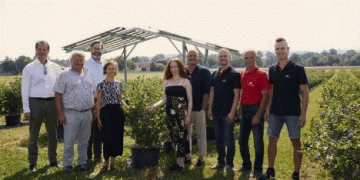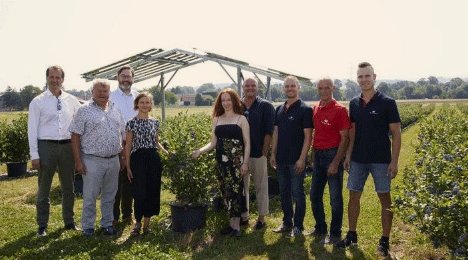Revolutionizing Agriculture with Agri-PV
The innovative Agri-PV system on the Wurzer farm integrates solar panels with agricultural land, providing a dual-use solution that enhances crop protection and energy production. This pioneering project, set on an area equivalent to three football fields, is designed to offer numerous benefits:
- Weather Protection: The solar panels shield the blueberry crops from hail, frost, heavy rain, and excessive sunlight, ensuring optimal growth conditions. This protection is critical for maintaining the high quality of the blueberries, as stated by Markus Wurzer.
- Enhanced Working Conditions: The shading provided by the panels reduces temperatures in the fields, creating a more comfortable environment for workers and customers during the summer harvest season. This aspect significantly improves labor conditions and customer experience during blueberry picking events.
- Sustainable Energy Production: The 4,764 solar modules installed will generate 1.7 million kWh of electricity annually, equivalent to the consumption of approximately 570 households. This renewable energy production supports regional sustainability goals and reduces reliance on non-renewable power sources.
- Optimized Microclimate: According to Klemens Neubauer, CEO of RWA Solar Solutions, the semi-transparent modules create balanced light conditions that foster a favorable microclimate for the plants. Results from a test facility in Pöchlarn show that this microclimate enhances plant growth under the panels.
- Continued Agricultural Operations: The elevated design of the solar panels allows for unrestricted use of tractors and other farming equipment, ensuring that traditional agricultural practices can continue seamlessly alongside the energy production.
Scientific Support and Future Prospects
The project, expected to be completed by autumn, is scientifically monitored by BLT Wieselburg, a partner in the ecoplus Technopol Wieselburg network. This collaboration ensures that the Agri-PV system’s impact on both energy production and agricultural output is thoroughly evaluated, providing valuable data for future implementations.
Austria’s first Agri-PV project with blueberries represents a significant step forward in sustainable agriculture and renewable energy integration. By combining solar power generation with enhanced crop protection and improved working conditions, this innovative approach offers a model for future agricultural practices. As climate change continues to impact farming, such dual-use solutions are crucial for ensuring both food security and energy sustainability.































